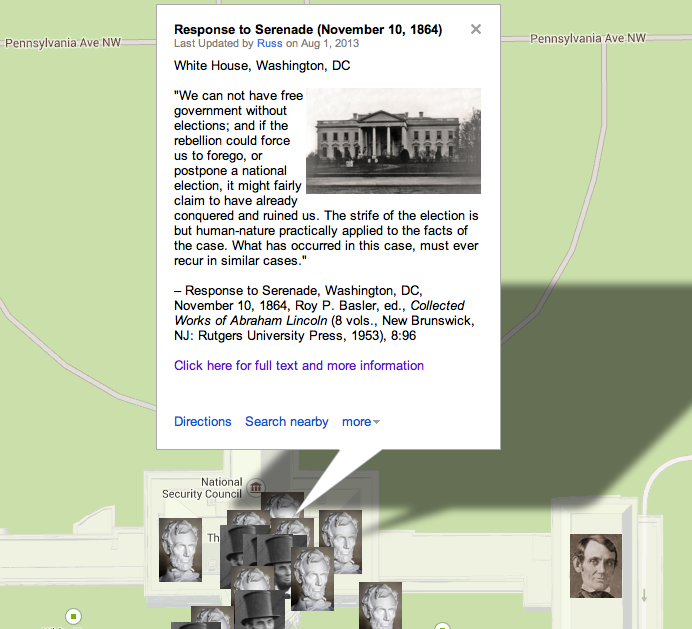Contributing Editors for this page include Rhonda Webb
Ranking
#36 on the list of 150 Most Teachable Lincoln Documents
Annotated Transcript
“We can not have free government without elections…”
Audio Version
On This Date
HD Daily Report, November 10, 1864
The Lincoln Log, November 10, 1864
Close Readings
Posted at YouTube by “Understanding Lincoln” participant Rhonda Webb, September 28, 2013
Custom Map
How Historians Interpret
“That Americans would conduct a presidential campaign during a titanic civil war amazed German-born Francis Lieber, professor of history and political science at Columbia University. ‘If we come triumphantly out of this war, with a presidential election in the midst of it,’ he wrote in August 1864, ‘I shall call it the greatest miracle in all the historic course of events. It is a war for nationality at a period when the people were not yet fully nationalized.’ Democrats predicted that the administration would cancel the election in a brazen attempt to retain power, but Lincoln would not hear of it. ‘We can not have free government without elections,” he believed; “and if the rebellion could force us to forego, or postpone a national election, it might fairly claim to have already conquered and ruined us.’ As dismayed Confederates saw their chances of winning on the battlefield fade, they pinned their hopes on Northern war weariness; if Lincoln could be defeated at the polls, they believed their bid for independence just might succeed”
— Michael Burlingame, Abraham Lincoln: A Life (2 volumes, originally published by Johns Hopkins University Press, 2008) Unedited Manuscript by Chapter, Lincoln Studies Center, Volume 2, Chapter 33 (PDF), 3646
“When serenaders came to the White House to celebrate his reelection, Lincoln touted the theme of charity: ‘Let us, therefore, study the incidents of this [election], as philosophy to learn wisdom from, and none of them as wrongs to be revenged’…With the phrase ‘planting a thorn in any man’s bosom,’ Lincoln borrows an Old testament reference to alien nations whom the Israelites allowed to remain in the promised land: ‘But if ye will not drive out the inhabitants of the land from before you; then it shall come to pass, that those which ye let remain of them shall be pricks in your eyes, and thorns in your sides, and shall vex you in the land wherein ye dwell.’”
— Lucas E. Morel, Lincoln’s Sacred Effort: Defining Religion’s Role in American Self Government (Plymouth: Lexington Books, 2000), 202-203.
NOTE TO READERS
This page is under construction and will be developed further by students in the new “Understanding Lincoln” online course sponsored by the House Divided Project at Dickinson College and the Gilder Lehrman Institute of American History. To find out more about the course and to see some of our videotaped class sessions, including virtual field trips to Ford’s Theatre and Gettysburg, please visit our Livestream page at http://new.livestream.com/gilderlehrman/lincoln

